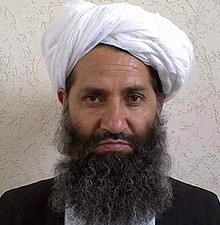RASC News Agency: The Taliban’s Ministry of Higher Education has announced plans for a conference at Maidan Wardak University titled “From Islamic Leadership to Social, Political, Economic, Cultural, and Shariah Progress: The Impact of the Amir al-Mu’minin’s Decrees.” According to Taliban officials, the forum is intended to examine the so-called “wisdom, philosophy, and religious justification” of decrees issued by the group’s reclusive leader, Hibatullah Akhundzada, while also claiming to “strengthen public trust” in their regime. A dedicated university webpage has been created to publicize the event, outlining its themes, call for papers, and the composition of its organizing committee.
This gathering is not an isolated academic exercise but part of a systematic campaign by the Taliban to convert educational institutions into propaganda platforms. Over recent months, similar events have been staged at universities in Kabul and Balkh, all carefully choreographed to present Hibatullah’s directives as scholarly doctrine. Behind this academic facade, however, lies an undeniable reality: these decrees serve as mechanisms of repression, designed to entrench Taliban dominance rather than advance society. For more than four years, international human rights organizations have issued consistent warnings that Hibatullah’s edicts stand in stark violation of universal principles of human rights and civil liberties. United Nations reports have sharply criticized the decrees for their sweeping prohibitions on women’s education, employment, and social participation. Far from being lifted, these restrictions remain fully in force, pushing Afghanistan deeper into what rights monitors describe as one of the gravest human rights crises on the planet.
Legal scholars and policy experts underline that these decrees not only suffocate basic freedoms particularly the rights of women and girls but also prevent the institutional development of a functioning society. Analysts widely agree that the Taliban’s governance style is incoherent, unprofessional, and devoid of constitutional or managerial standards. Instead of building credible state institutions, the regime governs by arbitrary decrees issued from Kandahar, plunging the country into legal chaos. The United Nations has characterized these policies as part of a “systematic pattern of gender-based persecution,” with the clear aim of erasing women from Afghanistan’s public sphere. UNAMA, Human Rights Watch, and Amnesty International have all reinforced this assessment, documenting how women have been pushed into near-total invisibility under Taliban rule.
The Taliban’s international isolation deepened further in July 2025, when the International Criminal Court issued an arrest warrant for Hibatullah Akhundzada on charges of “crimes against humanity” related to his systematic persecution of women and girls. The ICC accused the Taliban leader of enforcing gender apartheid as an official state policy a charge that has placed the regime among the world’s most egregious violators of international law. Experts warn that by promoting these decrees within universities, the Taliban are attempting to cloak repression in the language of scholarship. Far from fostering intellectual debate or academic research, such forums institutionalize authoritarian dogma, silence dissent, and destroy the very foundations of higher education. In practice, they are an assault on both the intellectual life of Afghanistan and the basic freedoms of its people.
What emerges is not a vision of progress but a deliberate strategy of control: a regime that exploits religion, undermines knowledge, and enforces obedience through fear. Afghanistan’s universities, once symbols of learning and hope, risk being transformed into echo chambers of Taliban propaganda monuments to repression masquerading as halls of scholarship.






